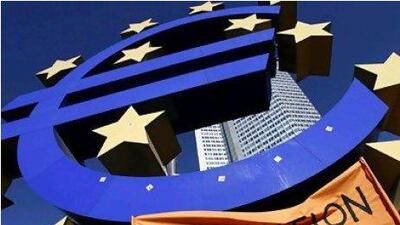Economists in the Middle East believe the euro-zone deal hammered out last week, without British involvement, does not mark the end of the European financial crisis. Volatility and uncertainty could increase in the region in the weeks ahead and harm GCC economies, they say.
Road to ruin or recovery?
Euro Zone The National charts Europe's struggles as it attempts to through of financial crisis. Learn more
On Friday, an EU summit in Brussels agreed on a package of measures to attempt to end the ongoing crisis over high levels of debt in the banking and sovereign sectors.
But Britain vetoed the possibility of a more integrated EU, backed by a new treaty, which many in the financial markets believed essential to end the crisis.
Tim Fox, the head of research and chief economist at Emirates NBD, the UAE's biggest bank, said: "Because of the UK opt-out, it is probably a less robust deal than it would have been if the 27 [members of the EU] had agreed. That would have thrown the full force of the EU behind it. "But now it will be an intergovernmental arrangement, and therefore more uncertain in its effectiveness."
Marios Maratheftis, the head of Middle East research for Standard Chartered said "what we saw from Brussels does not solve the problem". "To satisfy markets we need to see a viable lender of last resort in Europe, which means the European Central Bank [ECB], and some stimulus and reflation in Germany," he said.
The crucial test for the financial markets has been the willingness of the ECB to buy bonds from indebted banks, and while the ECB has increased by €500 billion (Dh2.45 trillion) the firepower it has to do this, some in the markets worry whether this will be enough to halt runs on "peripheral" countries such as Italy and Spain.
"I don't think they [ECB] have enough to give the market confidence and stability. It leaves something to be desired," Mr Fox said. "A lot can happen between now and the March deadline for implementing these measures."
Another area of concern for Middle Eastern economies is the increased need for capital by European banks, many of which have been investors in regional economies and participants in financial restructurings in some parts of the Gulf.
Last week it emerged that European banks, including the strongest in Germany, will need €114.7bn of new capital by next year to meet "stress tests" put in place by the EU authorities.
"There will be more deleveraging and less capital available, and the Gulf region will have to look elsewhere, to alternative sources, for capital," Mr Fox said. "Refinancings and raising new finance are going to be that much harder."
Mr Maratheftis said: "Global liquidity will be affected, but the GCC region is well placed in this regard, as it is a net exporter of capital. But private-sector liquidity will remain tight, and this will affect the maturity of bonds in the coming year in a place like Dubai."
A banker who declined to be identified said: "The big risk for Dubai and other highly indebted economies is that the European banks will simply pull out of restructurings going on now. They will not be able to roll over or refinance borrowings if they are under severe pressure themselves at home. All EU banks, including the British, which are big creditors here, will be much more risk-averse."
If the EU summit deal does not halt the ongoing crisis in the euro zone, it will also hurt the global economy, of which the Middle East is an integral part.
"The UAE, for example, does not export that much to the euro zone, and you could argue that a cheaper euro will make UAE imports cheaper," Mr Fox said. "But that benefit will probably be counterbalanced by the overall impact on global trade if the euro zone breaks up."
Said Hirsh, a Middle East analyst at the London consultancy Capital Economics, said there could be repercussions for the energy sector from the events in Europe.
"What should worry the Gulf is how a crisis in the euro zone affects the rest of the world, and Asia in particular," he said. "If there is a slowdown in economic growth, it will affect demand for and the price of oil, and some Gulf countries could go into deficit. They have high commitments to public spending right now, and that could be affected. A diversified economy like the UAE could be more exposed to a slowdown in global growth and a fall in oil demand, but Saudi Arabia and Kuwait would see a big hit to revenues."
Mr Maratheftis said: "This is a western crisis, originating in the US and now rolling over to European sovereigns. But not everything in the world is broken. The emerging markets are not broken."
He added that economic growth in the UAE would probably be slower next year as a result of the euro-zone crisis.
twitter: Follow and share our breaking business news. Follow us

